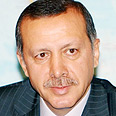
Recognizing this path, Turkey’s foreign policy is expected to grow more defiant of its Western partners and lead to increased cooperation with Iran. Consequently, the West must revise its policy regarding Turkey and recognize it as a leading regional actor and a potential mediator with Iran.
Turkey is entering its seventh year of outstanding economic growth. The 1990s average growth rate of 2.3 percent has more than doubled, reaching a record high of 9.9 percent in 2006, all under the Islamic AK Party.
This consistent growth, accompanied by the landslide victory in last month’s elections, provides the government with stability in promoting its long term policy regarding economics, EU integration and facing the Kurdish challenge.
A major component in sustaining the Turkish growth is the gradual process of consolidating it as a leading energy transit state. After completion of the Baku-Ceyhan pipeline in its energy grid project, Turkey is moving ahead to complete the "Nabuco" phase by 2012.
This process dramatically increases the country’s leverage on the EU by potentially easing its growing dependency on Russian gas. At the same time, however, the Nabuco line opens a channel to Iran, which is constantly looking for a partner in developing its huge (second only to Russia) gas reserves, especially under the current sanctions regime and its outdated refineries.
Hard-line Diplomacy
Emboldened by these trends and amidst growing anti-American public sentiment, Turkish foreign policy is growing indifferent to Western pressure. The most recent in a series of obstinate diplomatic and economic measures was the signing of a memorandum of understanding for a long-term energy deal with Iran, in complete defiance of US pressure and mounting sanction efforts in the UN.
In a recent interview to Forbes, Prime Minister Erdogan articulated the ground rule of the 21st century Turkish foreign policy: “Iran made us an attractive offer... Should we not think of our country's interests at this point? Is the United States going to ask why we did not seek their permission? I believe they (the US) will understand.”
Neglecting these trends and the clear signals voiced in Turkey, two of its major western trade and security partners, the US (Turkey is still an important member of NATO) and the EU are insisting on holding on to their current approach, disregarding Turkey’s regional ascension.
The EU still treats Turkey as if it is doing it a favor by discussing its potential integration into the union. While stubbornly prolonging the accession negotiation and insisting on halting discussion upon each and every hurdle, Turkey is growing less inclined to walk down the integration path.
The election of the French Nicolas Sarcozy, a staunch objector to Turkey’s membership, dialogue is yet another setback in this relationship. Turkey’s Foreign Minister Gul acerbically referred to the current EU conduct as "petty diplomacy that might only be solved when Europe realizes it’s in its own interest to accept Turkey, a growing economic power, as a member."
America, for its part, is threatening to sanction Turkey if it proceeds in promoting the memorandum of understanding with Iran. State Department official Matt Bryza responded to news of the memorandum by stating that America “Hopes the statement of intent never goes to reality.” He later warned that any Turkish investment in Iran’s energy sector would violate US law and could prompt sanctions on Turkey.
A new approach
These recent events, compounded by the American and European refusal to revise their diplomatic approach to Turkey, provide Erdogan with growing disincentives to work with the West. Should current trends persist, Ankara’s leverage is expected to grow, as it has a lot to offer as a constructive regional leader and a moderate Islamic energy-transit state in the making.
A new approach must reflect a recognition of Turkey’s growing influence. The west should work to keep Turkey as the Middle in the East and not push it towards the extremist end of the regional map.
Two immediate steps are easy to perform in this regard, in conjunction with re-framing the EU negotiation, while it is still considered a carrot and not a stick.
Washington should seriously consider inviting Turkey to the planned Israeli-Palestinian conference as a major stakeholder in the potential re-shaping of the Middle East.
In addition, as a "grand-bargain" between the international community and the local actors surrounding Iraq seems to be forming, Turkey should be given a seat at the table, recognizing its worries regarding the Kurds, which is one of the joint-interests gravitating it towards Iran.
Jonathan Adiri is an analyst as the Reut Institute















